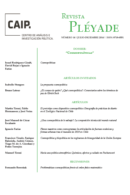
Published 2014-12-28
Keywords
- atmospheres,
- contamination,
- ecology,
- care,
- Puchuncaví
How to Cite

This work is licensed under a Creative Commons Attribution-NonCommercial 4.0 International License.
Abstract
This paper explores the possibilities of expanding the cosmopolitical proposal to what I call atmospheric politics or atmopolitics. Drawing on ethnographic research in Puchuncaví, one of the most polluted zones in Chile, I argue that in situations of radical uncertainty the ‘cosmos’ emerges as a vibrant, ecological and affective meshwork that envelops and sustains life. I also claim that the atmospheric energisation and problematization in Puchuncaví acquires all its affective and evidential intensity through care: it is the loving and sensitive attention deployed by neighbours upon their love ones, including plants, which specifies Puchuncaví’s chemo-affective ecology. In order to show the generative and co-productive interplay between chemical excess, affective atmospheres and practices of care in Puchuncaví, I rely on three ethnographic vignettes – one about intoxicated bodies, another one about chemicals in everyday life, and the last one about plants. In spite of their multiple overlaps, each one of these stories locates the relation between atmospheres, chemicals, affects, and politics in a particular experimental locus. In the concluding section I reflect on how this experimental interplay destabilises the parameters of politics as delineated by the social sciences, and particularly in the field of science and technology studies.